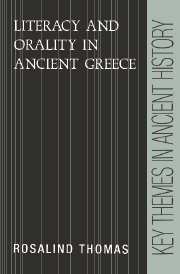Book contents
- Frontmatter
- Contents
- List of figures
- Acknowledgements
- List of abbreviations
- 1 Introduction
- 2 Literacy and orality
- 3 Oral poetry
- 4 The coming of the alphabet: literacy and oral communication in archaic Greece
- 5 Beyond the rationalist view of writing: between ‘literate’ and ‘oral’
- 6 Orality, performance, and memorial
- 7 Literacy and the state: the profusion of writing
- Epilogue: the Roman world
- Bibliographical essay
- Bibliography
- Index
7 - Literacy and the state: the profusion of writing
Published online by Cambridge University Press: 18 January 2010
- Frontmatter
- Contents
- List of figures
- Acknowledgements
- List of abbreviations
- 1 Introduction
- 2 Literacy and orality
- 3 Oral poetry
- 4 The coming of the alphabet: literacy and oral communication in archaic Greece
- 5 Beyond the rationalist view of writing: between ‘literate’ and ‘oral’
- 6 Orality, performance, and memorial
- 7 Literacy and the state: the profusion of writing
- Epilogue: the Roman world
- Bibliographical essay
- Bibliography
- Index
Summary
INTRODUCTION: LITERACY AND POWER
The modern state is inconceivable without its extensive record-keeping, its administration and bureaucracy. Information for and about the population is amassed in large quantities. The collection of taxes involves enormous paperwork. Economic, social, and political decisions may be based on elaborate data collected and stored with the aid of writing. Not surprisingly, indeed, it has been said that writing is essential to the definition of the state and its power. More cynically, as we saw, the anthropologist Lévi-Strauss once claimed in a famous passage that writing was an essential tool of empire and expansion, since it ‘seems to have favoured the exploitation of human beings rather than their enlightenment’, and that ‘the primary function of written communication was to facilitate slavery’. In ancient Mesopotamia, writing was indeed used from early on for bureaucracy and exploitation: in fact it was used exclusively for administrative records and lists for its first 600 years, and its role as an instrument of power and control in China and Egypt also may suggest that the development of complex state-structures is at least related to, if not closely bound up with, the development of literacy.
When we look more closely at such theories, however, the relation of writing to ‘power’ or to the state is often left extremely vague.
- Type
- Chapter
- Information
- Literacy and Orality in Ancient Greece , pp. 128 - 157Publisher: Cambridge University PressPrint publication year: 1992

